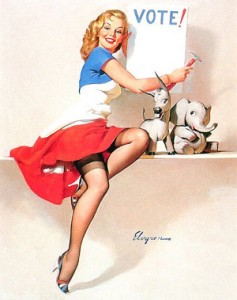My good friend and fellow staff writer, Christopher Oppermann, refuses to vote. He is one of many Libertarians who choose not to vote. The rationale behind this decision involves a mixture of new age disillusionment and old fashioned laziness.
More specifically, Chris refuses to vote for utilitarian and non-utilitarian reasons. In short, Chris, like many others, feels his vote is ultimately inconsequential and views the state as nothing more than an instrument, relieving him from any principled reason to vote.
To start off with, Chris’s utilitarian argument rests on a fairly narrow view of “utility.” He writes, “an individual’s vote only has consequence if it serves as the tie-breaker.” Chris views politics as a zero-sum game. Firstly, he overlooks the fact that how much a candidate wins by largely informs how that politician enters office. In a study done at the University of Nebraska, researchers found that the electoral strength with which presidents assumed office increased their support among congressmen, particularly in the Senate. Votes are the strongest indicator of public opinion. Since public opinion can never be entirely unified, it is important for lawmakers to gauge to what extent the public favors a politician.
Secondly, implicit in his argument is a sense of immediacy. Elections may be winner-take-all battles but the grand scheme of politics is a continuous war. A politician may lose a race, but the support for his ideals does not automatically end with his campaign. As a longtime Libertarian, Chris should know that. Campaigns don’t just get candidates elected, they get ideas out there and the success of those ideas is measured in votes. The results of previous elections affect the results of later ones. Just take a look at how many articles approximate the likelihood of Obama’s reelection in 2012 by the voter turnout in 2008.
Chris deviates from his utilitarian view of voting, briefly quoting Friedman on the purpose of the state. However, Chris is being fairly disingenuous by implying the state’s sole purpose is instrumentality in order to exempt him from “civic duty.” If nothing but convenience and freedom dictated where Chris’s allegiances lie, I’d ask him for a postcard from Estonia, where one can legally buy pot from a prostitute. More likely, Chris does feel some patriotism for the United States- perhaps not enough to vote, but enough that he should feel guilt if he doesn’t.
Chris then grants a certain amount of civic duty but maintains that there are more effective ways to involve oneself than to simply vote. He offers civil servants, politicians, and journalists as examples. However effective those roles may be, they do not answer why Chris doesn’t vote. Voting and writing are not mutually exclusive exercises of “civic duty.” 
Now let’s get down to specifics.
The exact costs of voting for Chris are 5 minutes, 67 cents, and 50 calories (assuming he lives in Mather House, gets paid minimum wage, and is in regular health).
The benefits are twofold: utilitarian and non-utilitarian. The latter are far more persuasive. Chris’s vote may not affect an outcome, but it is already the outcome of historic battles. People Chris never knew died for his particular suffrage. Americans, Catholics, non-landowners, Mexican-Americans, and finally, adults under 21 all fought for Chris’s suffrage. If anything more than just being guilt-averse, Chris might take personal satisfaction from voting.
As for utilitarianism, Chris has (very approximately) a one in ten million shot of being the “decisive” vote in a presidential election, or the proverbial snowball’s chance in hell. Still, no matter how unlikely, one out of ten million is infinitely more than zero. Also, given that the candidate he chooses may very well determine the fate of the free world, the stakes are rather high.
Yet voting, like life, does not always have to be according to probability. Three hundred Spartans died in Thermopolis fighting what they knew was a futile battle against the inevitably victorious Persians. Maybe we should change how we view ‘utility’ seeing as our chances of dying are 1 to 0.
And if all else fails, Chris should vote to get a shiny sticker.
Photo Credit: http://www.thenakedhero.com